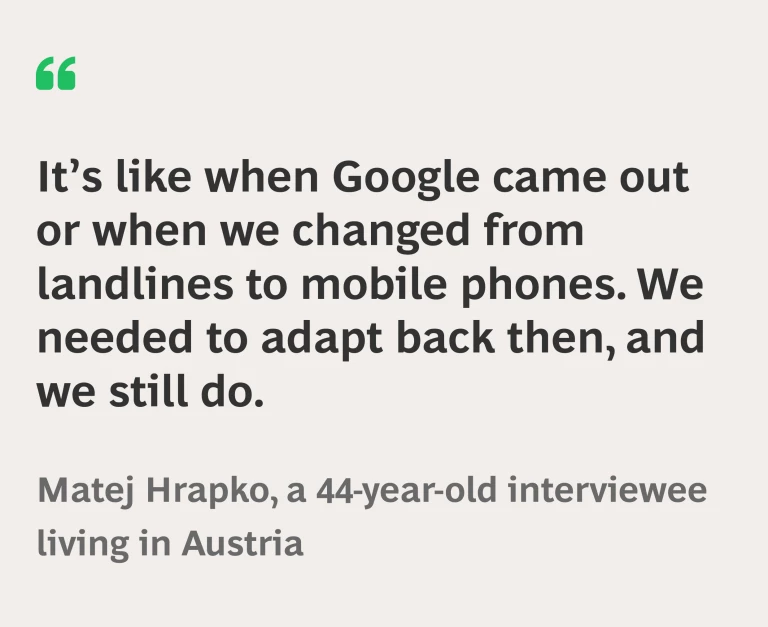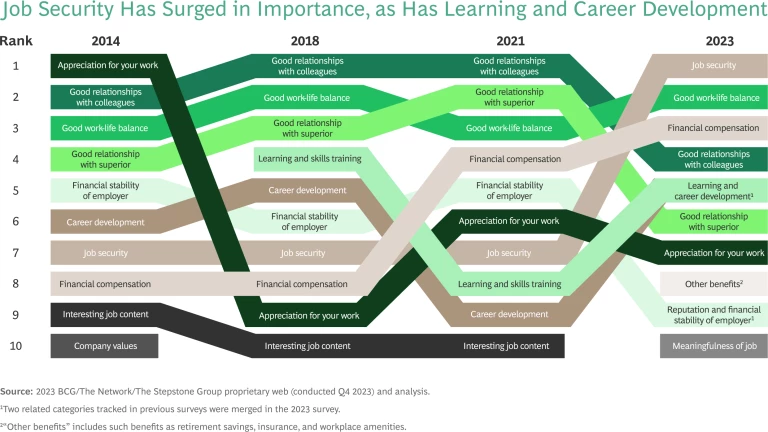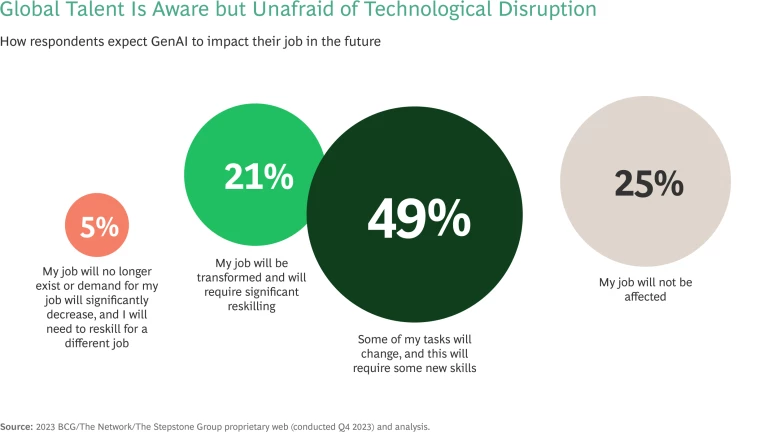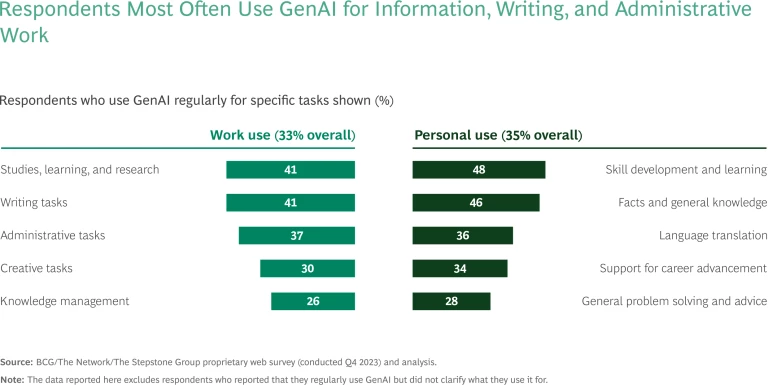“I'm not afraid of new beginnings. If you are afraid, that can limit your abilities. I feel confident that even if I lose a job, I can find another.” That’s what Anne Granelli, a 54-year-old Swede who is currently working in Abu Dhabi in the health care field, told us. Anne is a longtime participant in our Decoding Global Talent series and an early adopter of technologies, including GenAI .

We have observed plenty of occasions for new beginnings in the ten years since we began to track workplace trends in our Decoding Global Talent series. We’ve seen ways of working change dynamically (in response to exponential shocks) and deterministically (as a result of long-term trends).
During this time, multiple factors—notably, the race for talent, geopolitical tensions, and economic instability—have disrupted global business operations. Alongside these immediate changes, workplace priorities continue to feel the influence of longer-term macro trends: an increased focus on climate and sustainability; a renewed commitment to diversity, equity, and inclusion ; major demographic shifts; and the continuing appeal of global mobility . Collectively, these forces help shape a workplace that is continuously adapting to new realities and challenges. And even as these shifts proceed, workers and employers are digesting the most recent technological game changer: GenAI.
Employers must understand what matters to workers and job seekers. So, we sought answers to key questions:
- What do workers value most in a job?
- How do job seekers perceive their position and negotiating power on the labor market?
- Do people use GenAI? What impact do they think GenAI will have on their jobs, and what are they planning to do to ensure that they have marketable skills now and in the future?
- What should employers do to attract and retain workers?
How Work Preferences Are Shifting in the Age of GenAI
About the Decoding Global Talent Series
- The Decoding Global Talent series is the largest data source on the mobility preferences of workers globally. Our cumulative data set comprises almost 900,000 responses on where and how people want to work around the world.
- It is a collaboration of BCG, The Network, and The Stepstone Group.
- The current report explores trends in preferred ways of working, including the most valued workplace attributes, willingness to reskill for new opportunities, and deal breakers that would make an otherwise good job offer unacceptable. It also provides an updated ranking of shifting workplace attributes.
- In this year’s survey, we explored a new influence on ways of working: GenAI. We asked survey participants whether, how, and how much they use GenAI. We also solicited their perspectives on how GenAI might affect their jobs.
What Matters at Work Is Shifting
Feeling appreciated, getting along with coworkers, and having a good work-life balance. A decade ago, these were the three workplace characteristics that people most valued. As time went on, having a good relationship with one’s superior grew in importance. In 2021, amid the pandemic, people still cared about relationships and work-life balance, but financial compensation gained importance, because income became less reliable for many workers.
Now, we see several interesting shifts in what workers want.

For the first time since we began our series, job security is the number-one work preference. This might come as a surprise, given that unemployment is low and job vacancies are high. Recent headlines have suggested that the emphasis on job security may stem from restructuring in several industries or increased geopolitical uncertainty.
We don’t think those are the main reasons. Instead, we believe that the response mainly reflects workers’ concerns about their long-term employability—because our data connects the desire for job security with increased awareness of technological disruption. Respondents who expressed concern about the impact of GenAI on their jobs were more likely to prioritize job security.
Technology’s effect on jobs is not new, but GenAI brings disruption to a new level, affecting diverse workers and impacting not just repetitive tasks but also creative and conceptual work. So, it’s easy to see why other attributes have also risen in the rankings: opportunities for learning and career development, financial compensation, and other benefits, such as retirement and insurance benefits.

But Global Workers Remain Confident…
Over the past several years, global demand for talent has grown. As recently as January 2024, the International Labour Organization reported that employers continue to struggle with talent shortages. This situation is unlikely to be resolved soon.
Against this backdrop, most of our respondents feel that they have the upper hand when it comes to obtaining the jobs they want with the features they want. Their confidence is not unfounded.

…Even in the Face of GenAI
Based on our survey results, GenAI doesn’t appear to be a major threat to livelihoods, as many have feared. Most workers aren’t terribly worried about AI pushing them out of their jobs.
But respondents don’t view the situation through rose-colored glasses, either. Most—some 70%—anticipate that their jobs will change, sometimes significantly, requiring them to develop new skills. Only a quarter of respondents think that GenAI will not affect their jobs at all.
Talent Is Embracing GenAI and Ready to Reskill
To understand how workers imagine their future careers, employers need to investigate their employees’ sentiments about and relationships to GenAI:
- 86% of respondents have heard about GenAI.
- >50% have experimented with it at least once recently.
- ~39% use it regularly, including 18% of respondents who use it several times a week.

People are open to reskilling, because of GenAI or for other reasons. In fact, nearly 60% of respondents are open to reskilling without qualification, and an additional nearly 40% are willing to reskill if necessary.

Various factors drive openness to reskilling. Respondents who live in countries where job security is especially important are more likely to be open to reskilling, likely motivated by a desire to ensure their long-term employability. Similarly, respondents who believe that GenAI will have a large impact on their jobs are more willing to reskill—perhaps as a preventive move so that they can switch to a different job altogether if necessary.
Employers Can Meet Workforce Needs
Committing to an existing or new employer is a decision that workers won’t make lightly, especially in turbulent times. To fill talent gaps, employers must optimize the talent cycle.
Our data shows that the workforce is open to change. We see this in respondents’ willingness to reskill and in their eagerness to embrace GenAI. As 35-year-old Italian entrepreneur Manuel Milliery, who now lives in France, puts it, ”I think people need change. Evolution, not change. The prospect of evolving along with the company is really appealing.”
For 27-year-old Hideo Daikoku, an R&D engineer from Japan, that prospect is already a reality. In his job, he says, ”I get to have some autonomy and creative control over the things I do. I can devote time to explore new topics that are related to the company’s larger goals.”
Of course, given talent’s affinity for mobility, the quest for evolution can mean looking for new job opportunities, too. Tomilola Abiodun, 32, who is originally from Nigeria and now works as a product manager and runs her own startup in the US, offers this advice: “There are many companies out there, many opportunities, and lots of things that you can do to make a difference. To think that you are stuck in a specific path or role would be a myopic view.”
Employers that can meet the evolving expectations of the workforce will gain a critical advantage in attracting and retaining talent in the highly mobile global labor market.












